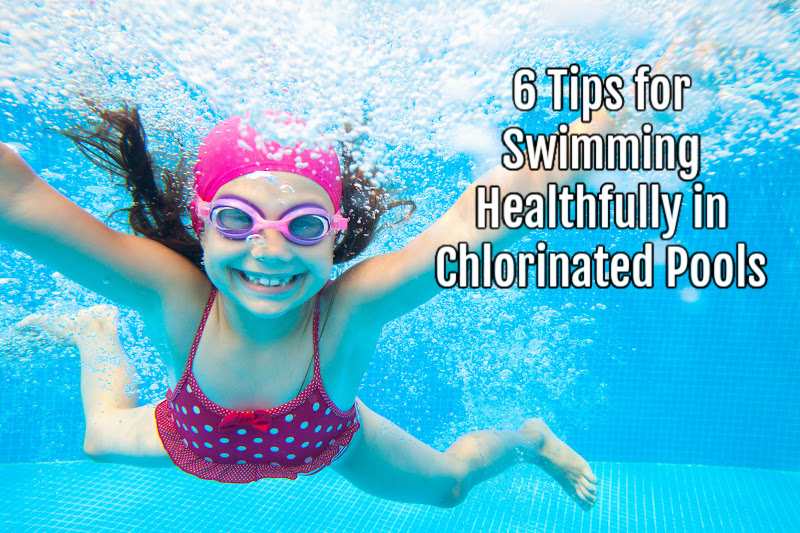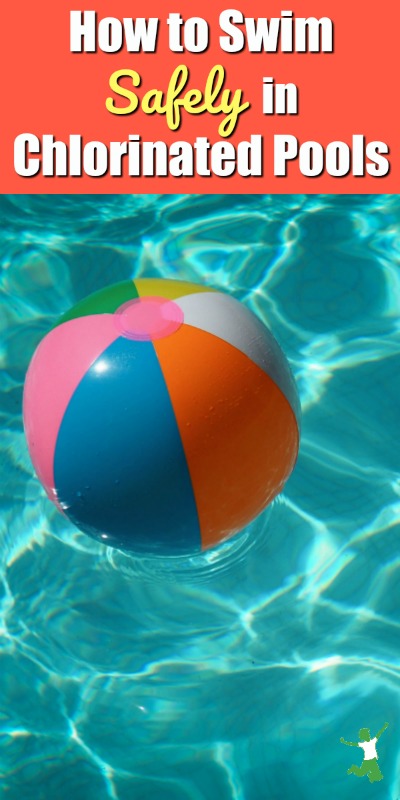The reasons why swimming in chlorinated pools is dangerous to health and the 6 steps to take to protect yourself and your family while still enjoying water fun all summer long.

The reasons why swimming in chlorinated pools is dangerous to health and the 6 steps to take to protect yourself and your family while still enjoying water fun all summer long.
An important topic to explore as we head into the summer season is chlorinated pools.
Chlorine is popular because it handles the three main jobs in keeping a swimming pool clean: It sanitizes (kills bacteria and germs), oxidizes (controls organic debris from perspiration and body oils), and deters algae. The chemical is unpopular, however, because it has a strong odor, reddens eyes, causes allergic reactions in some swimmers, and is a known carcinogen – meaning it has been linked to cancer!
Chlorine absorbs into your skin. Too much exposure to chlorine has been linked to major health problems including reproductive disorders and even birth defects. It can cause your skin and hair to dry out and over time too much exposure can even cause wrinkles.
Editor’s Note: Have you ever wondered why Olympic swimmers seem to have so many wrinkles at such young ages and most of the men start losing their hair so quickly? Could it, in fact, be caused by overexposure to chlorine for so many years and so many hours every day? Perhaps so.
When chlorinated pools are indoors, toxic gases such as nitrogen trichloride are released, which can be very dangerous. When we breathe in this gas it can cause severe damage to the lining of the lungs which could lead to respiratory problems or asthma. This toxic gas can be harmful at any age yet it poses the most risk to elderly people and small children.
So while chlorine used to disinfect swimming pools is widely recognized as a health hazard, not everyone has access to the ocean or a lake, or pools treated with ozone, ionizers, bromine, silver-cooper, or other alternatives which can frequently be much more expensive.
6 Tips to Protect Health in Swimming Pools
If you or your family members do choose to swim in chlorinated pools, some recommendations I’ve read are to:
1. Swim in outdoor chlorinated pools only if at all possible. It is much safer because the toxic gases are mostly eliminated in the open air.
2. Swim in chlorinated pools occasionally. It is regular exposure to chlorinated pools that presents the greatest risk to health.
3. Shower immediately before and after using a natural Castile soap.
4. Drink plenty of home-filtered water (better than bottled!) beforehand so that you are well hydrated.
5. Consider wearing a mask and snorkel to shield your eyes – and even a wetsuit, if you are willing to go that far!
6. Get fresh air afterward so you don’t continue to inhale the fumes, and can clear your lungs.
Why shower immediately before swimming in a chlorinated pool?
Julie Deardorff explains in her article published in the Chicago Tribute, “Another important reason to shower is that our bodies generally contain residue from consumer products, including perfume, make-up, body lotion, shampoo, and sunscreen.
When the chemicals used to disinfect the pool mix with organic matter (sweat, hair, urine) or nitrogen-rich substances (commonly found in consumer products) it can create a more toxic agent, said Michael Plewa, a professor of genetics at the University of Illinois whose new research has linked pool chemicals to health problems, including asthma and bladder cancer.”
Red, burning, itchy eyes and skin?
What I’ve read is that the presence of chloramines can cause reactions such as red, burning, irritated eyes: Chloramines form when chlorine reacts with ammonia. Ammonia enters the pool through sweat and urine. It is important to teach children not to urinate in pool water [even though it is chlorinated].
Also, showering before swimming can remove excess sweat that interacts with chlorine. My understanding is that if the sweat is on your skin, and hasn’t been rinsed off first in the shower, the chlorine will interact with the sweat on your skin as you enter the pool, and may result in some folks getting itchy skin.
So, what do you think? Do the benefits and joy of swimming and playing in a pool outweigh the health risks of chlorine?

Additional articles on this topic
The Dangers of Chlorine
Asthma In Swimmers
Swimming Pools May Increase Cancer Risk
The Hidden Danger of Swimming Pools
Swimming Pool Alternatives to Chlorine
Water Birth Dangers








With havin so much written content do you ever run
into any problems of plagorism or copyright infringement?
My blog has a lot of unique content I’ve either authored myself or outsourced but it appears a lot of it is popping it up all over the web without my authorization. Do you know any solutions to help stop content from being ripped off? I’d certainly appreciate it.
Ah, Andrew your reply was like a drink of water in this desert of misinformation. I swim often and I recently started bringing a small spray bottle with water and powdered ascorbic acid (Vitamin C) to shower with after practice. No more stinkies, no more licking my arm 2 hours later and smelling chlorine, and my hair likes it much better now! I just rinse in the shower, then turn the water off, spray myself down and scrub it in, then shower like normal. As for skin appearance, since beginning juicing and eating one avocado daily, along with swimming, I actually have people tell me I look YOUNGER. 1.5% of your body weight is Chlorine. It is actually used by many processes in our bodies. GO SWIM (and take some C water with you) it will increase your lung capacity A LOT and I am sure you know what that is linked to…..
Ascorbic acid (which is not really vitamin C) is made from gmo corn syrup and acetone. So you can feel free to get your exercise in a chemical bath and then “treat” yourself with some ascorbic acid, but I think you’re missing the point….
I don’t know the validity of that information, but no matter, as the powder got it out of my skin. I am not going to avoid the use of chemicals as if they are all bad, simply to avoid the use of chemicals. That would be a tough call, seeing how we are made up of the stuff. Chlorine occurs naturally in our bodies and serves a physiological purpose. If it makes any difference, i decided a while back to consolidate my post swim snack and stinkyz removal routines by taking an orange in the shower with me and using some of the jiuce from that instead, but, amazingly, it gives me the same results as your empty eggshell GMO Powder ‘C’. What point am I missing, btw?
Hi Everyone – I have done a ton of research in this area. The issue with chlorine appears to be that it stays bonded to the hair and skin long after swimming. Then, the lingering chlorine continues to damage the hair and skin, leading to damage and irritation.
Above, someone mentioned vitamin C — I couldn’t agree more. We tested and determined that applying a vitamin C rinse after swimming completely eliminates chlorine. See http://www.SwimSpray.com for more information. Especially look at the News section (listing articles on this topic) and also our Blog. And, feel free to contact us. We literally have a whole library on this topic!
Best,
Andrew
I’ve had a wonderful experience with Miami Pool Tech out of South FL. From the first visit to evaluate our pool, everyone has been very professional, prompt and courteous. Miami pool Tech treated our pool like it was their own. I would happily recommend Miami pool Tech. If you need good pool maintenance, go to http://www.miamipooltech.com
Is it, maybe, a good idea to use the steam room at the end of a swimming session?! As the body tends to sweat immediately and therefore (?) eliminate the harmful chemicals that have just entered your pores?!
Not an expert, just wondering. Thanks!
Sitting in the steam room or sauna after swimming in a chlorinated pool, showering immediately getting out of both the pool and the steam room/sauna, really helps to eliminate most of the chlorine odor from my body. I sit in there until sweat is dripping, about 15 to 20 minutes.
a Nutropatic dr told me “remember chemistry, Iodine works against Chlorine, so use it if in chlorine. guess i am having a chlorine/iodine war inside me. breathing this in indoor pool also concerns me – thank God i am from South Africa where we learned to swim [life saving & physical activities improve school work. WWi Germans used Chloride/bleach to destroy Brits. Histler used floride/asbestus in his death camp drinking water to subdue them before he killed them, so why are we using it??? Chlorine/bleach only one higher on PH scale – toiled/sink unclogger & we are supposed to take used chlorine.bleach to special disposal places as toxic waste! what are we doing to world water when these pools dump their water load [as in cleaning] into our world water system [the only world we have] Don’t put anything you would not drink into our water system, like down your toiled – we have enough 2nd hand drugs in it now, [we recycle all our water – you could be drinking Washington urine. look at how we are affecting life [born without sex & more] in what we have done to our water
I am looking for a full dry swimsuit so i can swim in contaminated [chlorine/fluoride – as all are here] without being in it. either pools will change water additives or these swim suits will become popular & sell well. World Health Organization say 89% of world population are now hypothyroid & avoid peanuts, soya & CHLORIDE & FLUORIDE – HELP. where can I get such a swim suit????? water activities are good but not this & there are much better options. God does NOT put CHLORIDE/FLOURI(DE in her ocean! life IS important – Save US, not $$, power, ignorance absuse of those in chargei
I get massive headaches from swimming in chlorinated pools. When we go on trips, of course the kids want to hit up the hotel pool, so I always try to find a salt-water (or saline) pool. They are hard to find but so worth it if you can. I don’t get headaches from these pools.
Our own families experience with chlorinated pools:
My youngest daughter used to vomit after swimming in chlorinated pools inside or out, public or private.
My son gets diarrhea. Probably from swallowing too much.
My other daughter gets candida infections externally.
As a 30 yr. swimming pool professional, let me reassure that despite inherent danger, there is no safer place for your family to swim than in a man made pool. No rip currents, hidden obstructions, sewage intrusion, you get the picture. If the chlorine smells, causes rash, or red eyes, that is an indication of trouble. A pool free of contamination and with a balanced pH will have no odor, will not irritate eyes or skin, and normally contains no more chlorine than what you will find in your home tap water that is suitable for drinking and showering in. Dry skin is however, is a result of over chlorination and there are many strategies available to mitigate or eliminate dry skin associated with swimming in pools.